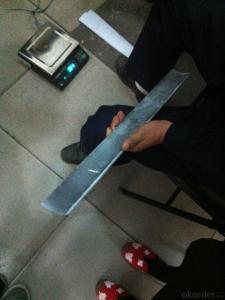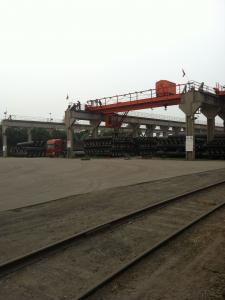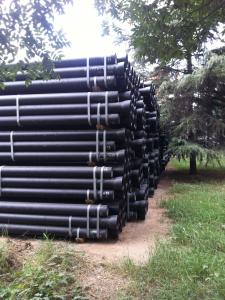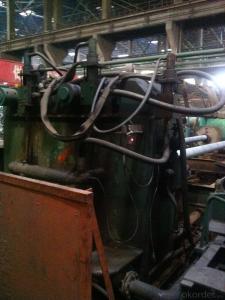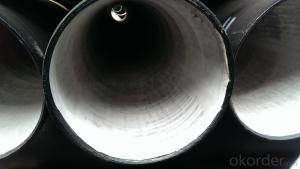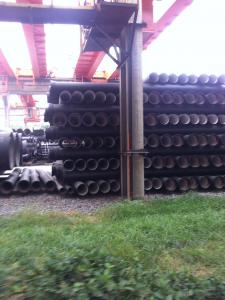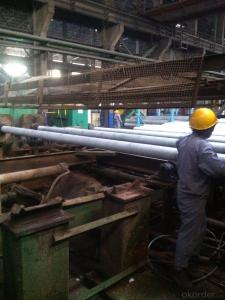DUCTILE IRON PIPE AND PIPE FITTINGS K9 CLASS DN1200
- Loading Port:
- Tianjin
- Payment Terms:
- TT OR LC
- Min Order Qty:
- 23 pc
- Supply Capability:
- 3000 pc/month
OKorder Service Pledge
OKorder Financial Service
You Might Also Like
Material : Ductile Cast Iron
Size Range : DN 80mm to DN 2000mm
Unit Effective Length : 6m or 5.7m
Manufacture Standard: ISO 2531:1998/ EN 545:2006/EN 598:2007
Annual capacity : 200,000 tons
Coating Exterior: Zinc 130g/m2 according to ISO 8179-1 and bitumen coating 70 microns.
Cement Interior: Portland Cement/ High Alumina Cement/ Sulphate Resisting Cement Lining according to ISO 4179
Special requirements on external coating and internal lining can be applied
We also provide accessories such as SBR/EPDM rubber gaskets, lubricant paste, pipe caps, PE sleeves, etc.
Additional Parts:
Each pipe is strictly inspected according to related standard to ensure permanently high performance.
Easy Installation at site and service free for life
Long Service Lifespan
Quotation will arrive you within 24hours once we get your inquiry.
We guarantee offering you a competitive price.
A copy of original inspection reports of pipes will be offered after shipment.
Photos of loading process will be sent to the customer after shipment effect.
We will follow-up the delivery progress after shipment effect and update to the customer on weekly basis.
- Q: Can ductile iron pipes be used for underground steam distribution systems?
- Ductile iron pipes are well-suited for underground steam distribution systems. They belong to the cast iron family, but have been treated with magnesium to enhance their flexibility and resistance to cracking. Consequently, they can endure high pressure and temperature conditions, making them ideal for underground applications like steam distribution systems. The strength and durability of ductile iron pipes are remarkable, allowing them to withstand the extreme conditions associated with steam distribution. Moreover, their corrosion resistance properties make them a dependable choice for long-term use in underground environments. Nevertheless, it is essential to apply proper insulation to prevent heat loss and ensure the efficiency of the steam distribution system.
- Q: Can ductile iron pipes be used in nuclear power plants?
- Ductile iron pipes are suitable for use in nuclear power plants due to their improved flexibility and strength compared to traditional cast iron pipes. They are known for their durability, resistance to corrosion, and ability to withstand high pressure and temperature conditions. These pipes are a reliable and robust choice for transporting water, coolant, and other fluids in nuclear power plants. However, it is crucial to consider the specific requirements and regulations of each power plant before selecting the pipe material. It is necessary to ensure proper testing, certification, and compliance with nuclear industry standards to guarantee the safe and efficient operation of the power plant.
- Q: Are ductile iron pipes susceptible to external loading or pressure?
- Ductile iron pipes, just like any other material, are susceptible to external loading or pressure. They possess a certain level of strength and tolerance to endure external forces. However, excessive external loading or pressure can result in the deformation or failure of these pipes. To avoid any harm caused by external loading, it is crucial to ensure proper installation and support of ductile iron pipes. Furthermore, the design and engineering of the pipeline system should take into account the expected external loading and pressure to guarantee the pipes' effectiveness in handling the anticipated conditions. Regular inspections and maintenance play a vital role in detecting and resolving issues associated with external loading or pressure that may arise over time.
- Q: How can the ductile iron pipe elbow be fixed?
- Ductile cast iron pipe in the groove pipe connection technology is also called the lathedog connection technology, has become the most liquid and gas pipeline connection technology, although this technology is later than foreign in domestic development time, but because of its advanced technology, domestic market quickly received. Since 1998, it has been developed and applied in just a few years. It has gradually replaced two traditional ways of pipe connection, such as flange and welding. Not only technically more mature, the market is generally recognized, but also by the national laws and regulations actively guide the policy. The application of grooved pipe connection technology makes the complex pipe connection procedure simple, fast and convenient. Took a big step forward in pipeline connection technology.
- Q: Are ductile iron pipes suitable for installation in areas with high groundwater table?
- Indeed, areas with a high groundwater table are suitable for the installation of ductile iron pipes. These pipes are renowned for their exceptional strength and durability, rendering them perfect for underground installations. They possess the ability to endure the external pressure exerted by groundwater without any deformation or collapse. In addition, their outstanding resistance to corrosion shields them from the potentially harmful impact of groundwater. Consequently, ductile iron pipes can be confidently utilized in areas with a high groundwater table, ensuring the establishment of dependable and enduring water supply infrastructure.
- Q: Can ductile iron pipe be used for wastewater treatment plants?
- Ductile iron pipe is indeed applicable for wastewater treatment plants. This material is robust and long-lasting, displaying resistance against both corrosion and abrasion. Given the severe and corrosive conditions commonly present in such facilities, ductile iron pipe is frequently chosen. Its exceptional hydraulic performance further enables efficient and effective transportation of wastewater. Moreover, the simple installation and maintenance process of ductile iron pipe make it a practical preference for wastewater treatment plants. Ultimately, ductile iron pipe proves to be a dependable and economical alternative for wastewater treatment purposes.
- Q: What are the meanings of cast iron pipe wall thicknesses LA, A and B respectively?
- According to its manufacturing methods can be divided into: sand, centrifugal pipe, straight pipe, continuous cast iron pipe and sand pipe.According to the material used, it can be divided into gray iron pipe, nodular cast iron pipe and high silicon iron pipe.1 、 water supply cast iron pipe:The use of cast iron cast iron water pipe of No. 18 above by adding nodulizer, after centrifugal ductile cast iron pipe by centrifugal casting machine, the performance of ductile iron pipe with nature, iron and steel, excellent corrosion resistance, good ductility, good sealing effect, simple installation, mainly for municipal, industrial and mining enterprises water, gas, oil etc.. Water supply pipe is the first choice, with high cost performance.2 、 sand casting centrifugal cast iron pipe:The sand casting centrifugal cast iron pipe is made of gray cast iron. It is suitable for the transportation of pressure water such as water and gas.
- Q: What are the typical joint sealing requirements for ductile iron pipes under pressure?
- The typical joint sealing requirements for ductile iron pipes under pressure involve the use of gaskets and mechanical joints to ensure a leak-free connection. Gaskets are typically made of rubber or synthetic materials and are placed between the pipe ends to create a tight seal. These gaskets are designed to withstand the pressure of the flowing fluid and prevent any leakage. They also provide flexibility to accommodate for any slight misalignment or movement of the pipes. Mechanical joints, such as push-on joints or restrained joints, are another common method of sealing ductile iron pipes. These joints consist of a mechanical connection that securely holds the pipe ends together. They can provide a reliable seal without the need for additional gaskets. In addition to gaskets and mechanical joints, proper installation techniques are crucial for ensuring effective joint sealing. This includes proper alignment of the pipes, correct tightening of bolts or screws, and the use of appropriate lubricants or sealants. It is important to note that the specific joint sealing requirements for ductile iron pipes under pressure may vary depending on the application, the type of fluid being transported, and the applicable industry standards or regulations. Therefore, it is essential to consult the manufacturer's guidelines and relevant codes to determine the appropriate joint sealing requirements for a specific project.
- Q: How long do ductile iron pipes last?
- Ductile iron pipes have a lifespan of about 100 years or even more, making them a highly durable and long-lasting choice for water and sewage systems.
- Q: Can ductile iron pipes be used for pressure surge applications?
- Yes, ductile iron pipes can be used for pressure surge applications. Ductile iron pipes have excellent strength and durability, making them suitable for handling surge pressures caused by sudden changes in flow rates or water hammer events. They can withstand high internal pressures and have a high resistance to impact and fatigue. Additionally, ductile iron pipes have a smooth interior surface that allows for efficient flow of fluids, minimizing the potential for pressure surges. However, it is important to consider factors such as pipe size, wall thickness, and proper installation techniques to ensure the pipes can safely handle the specific pressure surge conditions in a given application. Consulting with a professional engineer or pipe manufacturer is recommended to determine the suitability of ductile iron pipes for pressure surge applications.
Send your message to us
DUCTILE IRON PIPE AND PIPE FITTINGS K9 CLASS DN1200
- Loading Port:
- Tianjin
- Payment Terms:
- TT OR LC
- Min Order Qty:
- 23 pc
- Supply Capability:
- 3000 pc/month
OKorder Service Pledge
OKorder Financial Service
Similar products
Hot products
Hot Searches
Related keywords
